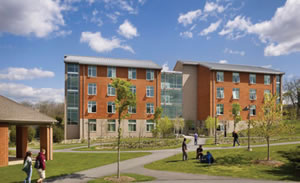Easy Wireless Access Control

Tyco Security Products provided Penn State a seamless
solution when it came time for a system-wide upgrade of
wireless locks and IP cameras.
The Pennsylvania State
University, better known as Penn
State, is a public research university
with a network of 24 campuses, including
nine with on-campus residence halls.
As part of a system-wide upgrade the
eight residential campuses under the domain
of Commonwealth Campus Housing and
Food Services, began the move to a single
security and event management platform
to support their video and access control
systems, including a new system of wireless
locks and upgraded IP cameras for the residence
halls and some outside group facilities
such as childcare and student centers.
Penn State, with its myriad campuses
across Pennsylvania, was operating on multiple
and disparate platforms for its academic
and physical security systems. They wished
to use Tyco Security Products’ Software House
C•CURE 9000 software as the standard security
management platform integrated among
the University and its campuses.
The switch to wireless locks improved
the ability for programming and monitoring
while also providing easier operational
use. The wireless locks, which are mounted
on the residence room doors, communicate
with a STANLEY Wi-Q portal gateway —
there are about 90 within the system —
which in turn communicate with the
C•CURE 9000 software.
“The student population had a tendency
to lose the keys that they needed to open
doors, so a wireless solution would make it
easier for the appropriate students to gain access,”
says Tracy Walker, assistant director of
Commonwealth Housing, Food Services and
Residential Life. The same card that accesses
the wireless room locks throughout the campuses
also works for card readers for copiers,
laundry machines and cash registers.
The STANLEY Wi-Q wireless locks
offered a tracking piece that regular keys
couldn’t provide and without having to
rely on conventional locking systems, the
campuses could cut down on the need for
locksmiths and having to change out cores at
the door.
www.tycosecurityproducts.com
This article originally appeared in the issue of .